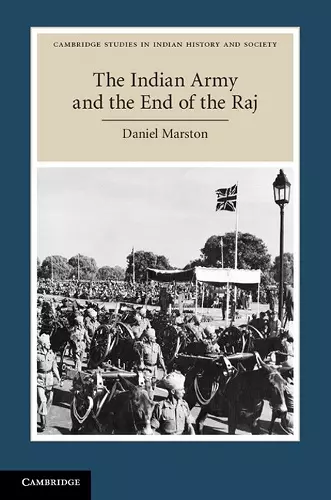The Indian Army and the End of the Raj
Format:Paperback
Publisher:Cambridge University Press
Published:17th Nov '16
Currently unavailable, and unfortunately no date known when it will be back
This paperback is available in another edition too:
- Hardback£105.00(9780521899758)

A unique examination of the role of the Indian army in post-World War II India during the run-up to Partition.
A unique examination of the role of the Indian army in post-World War II India in the run-up to Partition. Daniel Marston draws upon extensive archival research and interviews with veterans of the events of 1947 to provide fresh insight into the final days of the British Raj.The Partition of British India in 1947 resulted in the establishment of the independent states of India and Pakistan and the end of the British Raj. The decision to divide British India along religious lines led to widespread upheaval and communal violence in the period leading up to and following the official day of independence, 15 August 1947. In this book, Daniel Marston provides a unique examination of the role of the Indian army in post-World War II India. He draws upon extensive research into primary source documents and interviews with veterans of the events of 1947 to provide fresh insight into the vital part that the Indian Army played in preserving law and order in the region. This rigorous book fills a significant gap in the historiography of the British in India and will be invaluable to those studying the British Empire and South Asia more generally.
'The 'Transfer of Power' in India has often been written about in terms of politics and personalities, but lingering largely unnoticed in the background has been a crucial, unasked question: why did the Indian Army, under stresses as powerful as any army in modern history has experienced, not simply disintegrate, throwing the subcontinent into total chaos? Mixing massive archival research, interviews with surviving participants, British, Indian and Pakistani, and a profound empathy for the subject, Marston answers that question in a book that will certainly readjust perspectives on the end of the Raj, and be essential reading for any serious student of that epochal event.' Raymond Callahan, FRHS, Professor Emeritus, University of Delaware
'Daniel Marston has given us in this volume some deep insights into how the former British Indian Army went through a transformation to become the truly national armies of two independent states whose foreign and defence policies were very different to those of their former Imperial master. This volume is built on prodigious, accurate documentary work and hundreds of interviews with surviving British, Indian and Pakistani soldiers of those times. It is a complex, fascinating and well-told story, and reinforces in the mind of the reader the value of the old British model of military-political relations. At the same time, it demonstrates the importance of the liberal post-imperial policy which permitted and encouraged the transfer of power while still retaining a high military capability which was to be put to the test all too soon.' Robert O'Neill, Chichele Professor of the History of War, All Souls College, University of Oxford
'Daniel Marston's superb history shows how the Indian Army stayed cohesive and effective in the face of external enemies and the near-collapse of the colonial state. It is a story with valuable lessons for policymakers looking to understand what keeps armies together - and out of politics - in democratic transitions.' Steven I. Wilkinson, Nilekani Professor of India and South Asian Studies and Professor of Political Science and International Affairs, Yale University, Connecticut
'Marston's work is eminently readable and presents a very clear analysis of what strengths the Army of the Raj was able to draw upon to overcome civil and political disorder. His use of a myriad of primary sources further reinforces his thesis and position. His is not a study of the individual soldier but their reminisces and that of their peers and commanders are the basis upon which the work is built … Marston's book is an outstanding work and deserves the closest of review.' Chris Buckham, War History Online (warhistoryonline.com)
ISBN: 9781316635513
Dimensions: 230mm x 153mm x 20mm
Weight: 590g
400 pages